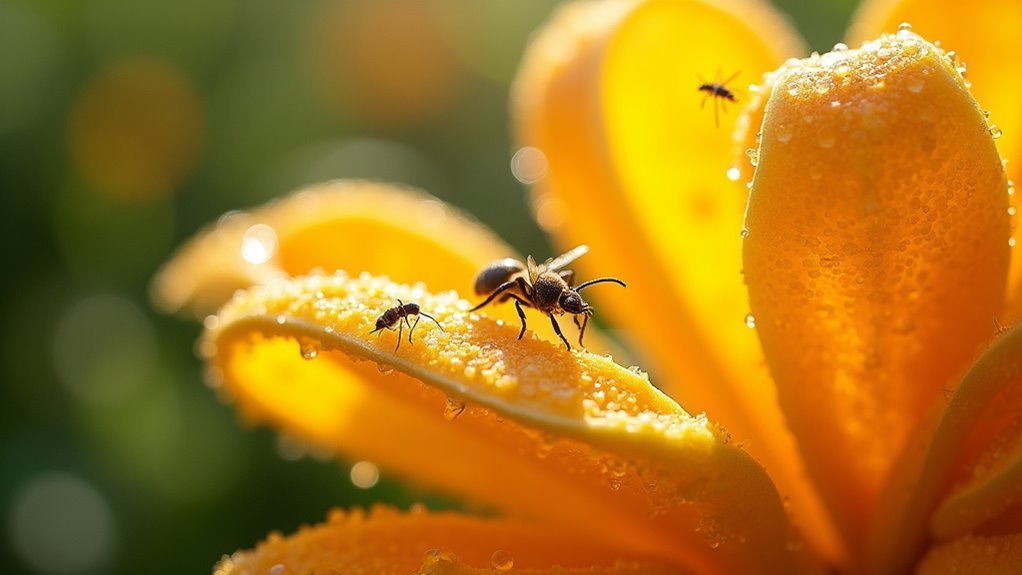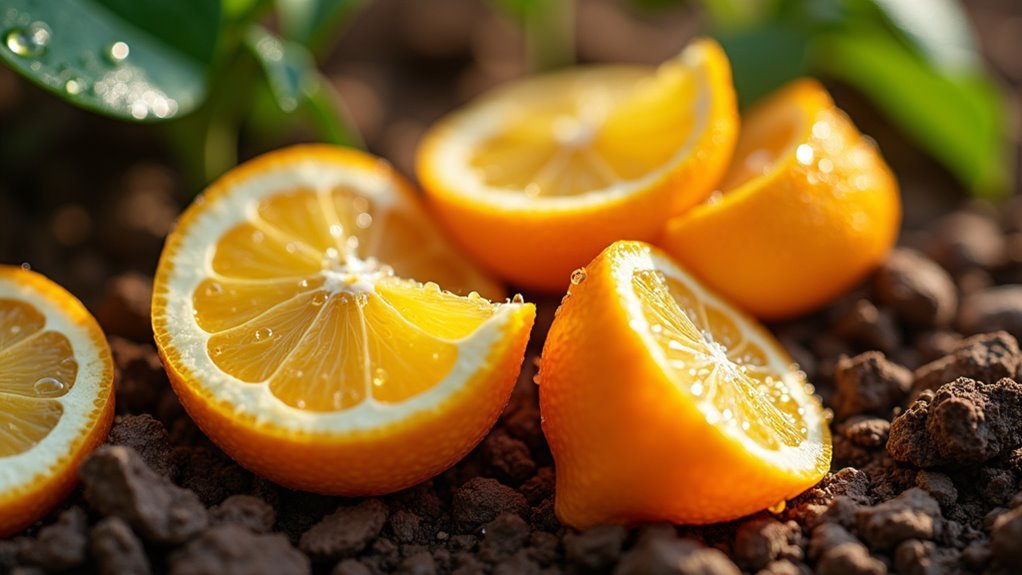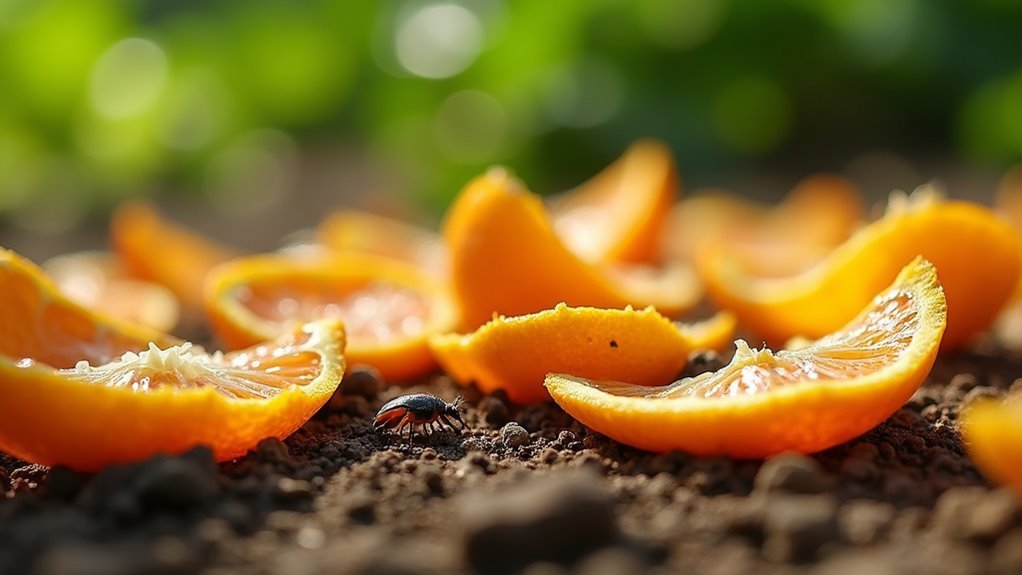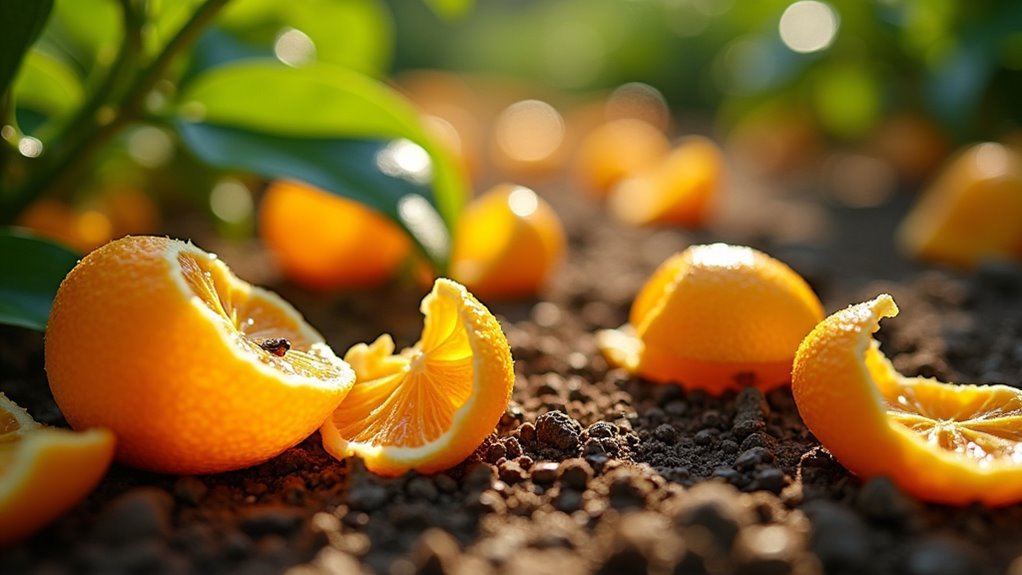Citrus peels repel garden pests through limonene, a compound that disrupts insects’ olfactory receptors and masks food source scents. You’ll find this natural deterrent confuses pests like aphids, mosquitoes, and fruit flies by blocking their ability to navigate and communicate. Fresh peels work best since they contain higher concentrations of volatile oils compared to dried versions. The citrus compounds overwhelm insects’ sensory systems, causing neurotoxic effects that impair movement and force relocation to more suitable environments.
The Science Behind Limonene and Natural Pest Deterrence

When you toss citrus peels into your garden, you’re releasing limonene, a powerful natural compound that disrupts insects’ ability to find their next meal.
This potent insect repellent works by interfering with pests’ olfactory receptors, effectively masking the scents that normally guide them to food sources.
Limonene proves particularly effective against mosquitoes, flies, and ants through its toxic properties that disrupt their growth and feeding habits.
The volatile oils in fresh citrus peels maximize this pest deterrence effect, though they’ll lose potency as they evaporate over time.
You’ll find this natural approach perfectly supports organic gardening practices, reducing your dependence on chemical pesticides while creating a healthier garden ecosystem that benefits both plants and beneficial insects.
How Citrus Compounds Disrupt Insect Sensory Systems
When you place fresh citrus peels in your garden, the limonene they release doesn’t just smell pleasant—it actively disrupts how insects navigate their world.
The compound masks the scents that pests rely on to find food sources, fundamentally blinding their olfactory systems and leaving them confused and unable to locate your plants.
You’ll find this disruption particularly effective because limonene also carries toxic properties that can harm insects while remaining completely safe for your garden’s ecosystem.
Limonene Toxicity Effects
How does limonene transform from a simple citrus compound into a powerful weapon against garden pests? This natural compound from citrus peels releases devastating toxicity effects that systematically dismantle insects’ survival mechanisms.
When you apply limonene-rich citrus peels around your garden, you’re deploying a biological warfare agent that attacks pests’ sensory systems at multiple levels.
Limonene doesn’t just repel garden pests—it actively poisons them. The compound disrupts their olfactory receptors, scrambling their ability to locate food sources and navigate effectively.
You’ll notice decreased pest activity as limonene interferes with their communication pathways, reducing feeding and reproductive behaviors.
Most importantly, exposed insects experience neurotoxic effects, suffering impaired movement and increased mortality rates. This makes limonene perfect for organic gardening since it targets harmful pests while protecting beneficial insects.
Scent Masking Properties
Beyond their direct toxic effects, citrus compounds excel at creating sensory chaos that leaves garden pests disoriented and unable to function.
When you place citrus peels around your garden, their volatile organic compounds release powerful aromas that overwhelm insects’ sensory perception systems. This scent masking disrupts their ability to detect essential pheromones and food sources they’d normally follow.
Here’s how citrus peels repel garden pests through sensory disruption:
- Pheromone interference – Strong citrus scents block insects from detecting mating and communication signals
- Food source confusion – Masking scents prevent pests from locating their preferred plants and nectar sources
- Navigation disruption – Overwhelmed sensory systems cause insects to lose their directional capabilities
- Reduced foraging success – Persistent citrus aromas create continuous confusion, forcing garden pests to relocate elsewhere
Olfactory Disruption Mechanisms
The limonene in citrus peels targets insects’ olfactory receptors with surgical precision, creating a biochemical jamming effect that renders their smell-based navigation systems virtually useless.
When you place orange peels around your garden, you’re fundamentally scrambling the insects’ ability to process chemical signals they depend on for survival. This aromatic compound interferes with their detection of food sources and mating opportunities.
The disruption works because insects can’t filter out the overwhelming citrus smell from their environment. Their sensory systems become overloaded, making it impossible to locate the plants they’d normally target.
Fresh citrus peels maximize this deterrent effect by releasing higher concentrations of aromatic compounds. However, you’ll need to replace dried peels regularly since they lose their pest-repelling potency as volatile compounds evaporate.
Comparing Fresh vs. Dried Citrus Peels for Garden Protection
While both fresh and dried citrus peels might seem equally useful for garden pest control, their effectiveness differs dramatically due to chemical composition changes that occur during the drying process.
Fresh citrus peels contain volatile organic compounds like limonene that actively repel pests through their strong scent. However, dried peels lose these pest-deterring properties as essential oils evaporate, making them ineffective for garden protection.
Key differences you should know:
- Fresh peels maintain potent concentrations of limonene and other compounds that effectively deter insects and small animals.
- Dried peels become counterproductive, often attracting unwanted critters like snails and slugs to your garden.
- Regular replacement of fresh peels guarantees consistent pest control, while dried versions offer no protective benefits.
- Fresh peels require more maintenance but deliver superior results compared to their dried counterparts.
Creating Effective Citrus Peel Mulch Applications

Since you’ve established that fresh peels outperform their dried counterparts, it’s time to harness their power through strategic mulch applications.
Start by chopping orange peels and other fresh citrus peels into small pieces to maximize their pest-repelling properties. Spread these chopped peels around your plants’ base, creating a natural barrier that’ll deter pests with their potent citrus scent.
Chop fresh citrus peels into small pieces and spread around plant bases to create an effective natural pest barrier.
For best results, bury the pieces a few inches deep within your existing mulch. This technique prevents larger animals from being attracted while maintaining the effectiveness of limonene against harmful insects.
As the peels decompose, they’ll release valuable nutrients like nitrogen and phosphorus into the soil, boosting overall garden health. Remember to replace the peels regularly to sustain their protective benefits.
Which Garden Pests Are Most Affected by Citrus Oils
You’ll find that certain garden pests react much more strongly to citrus oils than others, with some species showing dramatic behavioral changes when exposed to these natural compounds.
Soft-bodied insects like aphids, whiteflies, and fruit flies rank among the most vulnerable to citrus oil deterrents, often abandoning treated areas entirely.
The effectiveness varies considerably across pest types, with crawling pests like ants and slugs showing moderate sensitivity while flying insects typically demonstrate the strongest avoidance responses.
Common Vulnerable Pest Species
Although many gardeners struggle with persistent pest problems, citrus peels offer targeted relief against specific vulnerable species that can’t tolerate their potent compounds.
The limonene in citrus peels creates an effective barrier against numerous destructive insects that threaten your garden’s health.
These common garden pests are particularly susceptible to citrus-based deterrents:
- Aphids – These soft-bodied insects can’t withstand limonene’s toxic effects and quickly abandon treated plants.
- Ants and whiteflies – Both species retreat from areas where citrus peels are present due to scent disruption.
- Fruit flies and slugs – Volatile compounds in fresh peels effectively deter these moisture-loving pests.
- Mosquitoes – Their sensitive aroma detection makes them especially vulnerable to citrus oils.
While citrus peels repel harmful garden pests, they simultaneously attract beneficial insects like ladybugs.
Citrus Oil Effectiveness Levels
When examining citrus oil potency against different garden invaders, you’ll discover that effectiveness varies dramatically based on pest size, biology, and chemical sensitivity.
Citrus peels excel at repelling smaller insects through limonene compounds that prove toxic to their delicate systems. You’ll find orange peels particularly effective against aphids, whiteflies, and fruit flies, as these pests can’t tolerate the concentrated citrus aromas.
The natural compounds disrupt their scent detection abilities, providing excellent deterrence for mosquitoes, ants, and common flying insects in your garden.
However, you shouldn’t expect the same results with larger pests like rodents, which may actually be attracted to the peels rather than repelled by them.
Potential Drawbacks and Limitations of Citrus Pest Control

While citrus peels can offer some initial pest-deterrent benefits, they come with several significant limitations that gardeners should consider.
Orange peels deter certain pests temporarily, but their effectiveness quickly diminishes as volatile compounds evaporate. Unfortunately, these same peels can attract larger unwanted visitors like raccoons and slugs, creating bigger problems than they solve.
Key limitations include:
- Short-lived effectiveness – Peels lose their ability to repel pests once they dry out.
- Constant maintenance – Replacing peels regularly becomes labor-intensive and impractical.
- Unintended attraction – Decaying peels draw slugs, insects, and larger animals to your garden.
- Sanitation issues – Moldy peels create unsanitary conditions that can worsen pest problems.
These limitations often outweigh any temporary benefits citrus peels might provide.
Frequently Asked Questions
Do Citrus Peels Keep Bugs Away?
Yes, you’ll find citrus peels repel bugs effectively. They contain limonene, which is toxic to insects like mosquitoes and ants. The strong scent disrupts their food detection, making them avoid treated areas.
Are Citrus Peels Good for the Garden?
You’ll find citrus peels aren’t ideal for direct garden use since they attract raccoons and snails. They’re better composted first, where their nutrients can enrich soil without creating pest problems.
What Animals Do Citrus Peels Repel?
You’ll find citrus peels repel rodents, slugs, and raccoons due to their strong scent. They’re also effective against mosquitoes, flies, and ants, though they might attract wasps if not managed properly.
Why Should You Place Orange Peels Around Your Patio?
You should place orange peels around your patio because they’ll naturally repel ants, flies, and mosquitoes through their citrus scent, creating a comfortable outdoor space without using harmful chemicals.
In Summary
You’ll find citrus peels offer a natural, eco-friendly approach to garden pest control through limonene’s powerful deterrent properties. While they won’t eliminate every pest problem, you can effectively reduce aphids, ants, and soft-bodied insects by applying fresh peels strategically around vulnerable plants. Don’t expect miraculous results overnight, but you’ll appreciate having a chemical-free option that’s both budget-friendly and environmentally responsible for your garden’s health.





Leave a Reply